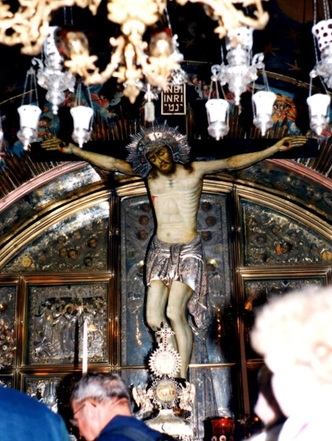 Photo ©2015 Malcolm Hamblett
Photo ©2015 Malcolm Hamblett This song of ascent reveals the work of a righteous God using agrarian imagery as one who “cuts me free from the cords (or yoke) of the wicked” (v.4). The “me” in this passage is Israel, God’s holy people, who have been, and are being, delivered and set free from their oppressors. The psalmist harkens back to the time of Israel’s youth (v.1) as a new nation, most likely referring to the deliverance from Egypt and the oppression of slavery under the yoke of Pharaoh. However, this deliverance from oppression by Israel’s enemies has not yet reached its full completion and appears to take center stage in this song. The psalmist appears to speak a word of judgment over Israel’s oppressors asking that first, “they be turned back in shame” (v.5), second that “they be like grass that withers” (v.6), and third “let no one say to them a blessing in the Lord’s name” (v.8).
In this journey up to Jerusalem, also referred to as “Zion”, these travelers are moving closer and closer to a celebration or feast in God’s holy city. The author’s rich use of agrarian imagery most likely ties this song to the fall harvest time, during the Feast of Tabernacles which also correlates with the Exodus from Egypt already mentioned above (v.1). The celebration here is tied to the proclamation that Israel’s oppressors have no part in the blessings of God (v.8). This spiritual and physical journey is only for a sacred and holy people who belong to God and who have been freed from the wicked (v.4). The destination here is God’s Holy City, Zion, which belongs to a God who is Righteous and Holy. Thus Zion would not be a destination for the wick-ed or those who “hate Zion” (v.5) or who have “made long furrows on Israel’s back” (v.3). The author of this Psalm describes God as Righteous and one who acts on behalf of His people Israel, where God’s Holy peo-ple have been separated from those who seek to oppress and harm them by God’s own hand of deliverance and providence (v.4).
The apex of this Psalm is the realization that the destination for these travelers singing this Song of Ascent is related to the very freedom they sing about. Their destination is into a place free from oppression and into the very presence of the righteousness of God. Because God is Holy, it makes perfect sense that God’s city would also be a place that is Holy and sacred, a place where the wicked “turn back in shame” (v.3) and are not welcome, and a place where only God’s people belong.
As we reflect on a righteous God who is our own agent of deliverance from the wicked, let us also be remind-ed that our own spiritual destination is free from the oppression of the wicked and where we gather together with God’s holy people, rejoicing in the Lord’s deliverance. Amen.
- Daniel Ward
In this journey up to Jerusalem, also referred to as “Zion”, these travelers are moving closer and closer to a celebration or feast in God’s holy city. The author’s rich use of agrarian imagery most likely ties this song to the fall harvest time, during the Feast of Tabernacles which also correlates with the Exodus from Egypt already mentioned above (v.1). The celebration here is tied to the proclamation that Israel’s oppressors have no part in the blessings of God (v.8). This spiritual and physical journey is only for a sacred and holy people who belong to God and who have been freed from the wicked (v.4). The destination here is God’s Holy City, Zion, which belongs to a God who is Righteous and Holy. Thus Zion would not be a destination for the wick-ed or those who “hate Zion” (v.5) or who have “made long furrows on Israel’s back” (v.3). The author of this Psalm describes God as Righteous and one who acts on behalf of His people Israel, where God’s Holy peo-ple have been separated from those who seek to oppress and harm them by God’s own hand of deliverance and providence (v.4).
The apex of this Psalm is the realization that the destination for these travelers singing this Song of Ascent is related to the very freedom they sing about. Their destination is into a place free from oppression and into the very presence of the righteousness of God. Because God is Holy, it makes perfect sense that God’s city would also be a place that is Holy and sacred, a place where the wicked “turn back in shame” (v.3) and are not welcome, and a place where only God’s people belong.
As we reflect on a righteous God who is our own agent of deliverance from the wicked, let us also be remind-ed that our own spiritual destination is free from the oppression of the wicked and where we gather together with God’s holy people, rejoicing in the Lord’s deliverance. Amen.
- Daniel Ward
Today pray for:
Community Church of Huntington and their pastor Larry Detweiler
Jamaica Community Church and their pastor Norma Drosky
Rev. Vivan Martindale, Representative to the ABCUSA Board of General Ministries
Community Church of Huntington and their pastor Larry Detweiler
Jamaica Community Church and their pastor Norma Drosky
Rev. Vivan Martindale, Representative to the ABCUSA Board of General Ministries
 RSS Feed
RSS Feed
